Strontium Hawk (240GB) Review
by Kristian Vättö on June 25, 2013 8:00 AM ESTRandom Read/Write Speed
The four corners of SSD performance are as follows: random read, random write, sequential read and sequential write speed. Random accesses are generally small in size, while sequential accesses tend to be larger and thus we have the four Iometer tests we use in all of our reviews.
Our first test writes 4KB in a completely random pattern over an 8GB space of the drive to simulate the sort of random access that you'd see on an OS drive (even this is more stressful than a normal desktop user would see). I perform three concurrent IOs and run the test for 3 minutes. The results reported are in average MB/s over the entire time. We use both standard pseudo randomly generated data for each write as well as fully random data to show you both the maximum and minimum performance offered by SandForce based drives in these tests. The average performance of SF drives will likely be somewhere in between the two values for each drive you see in the graphs. For an understanding of why this matters, read our original SandForce article.
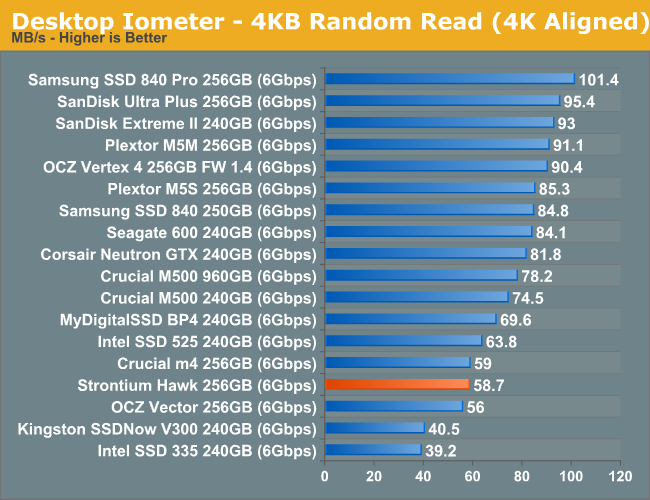
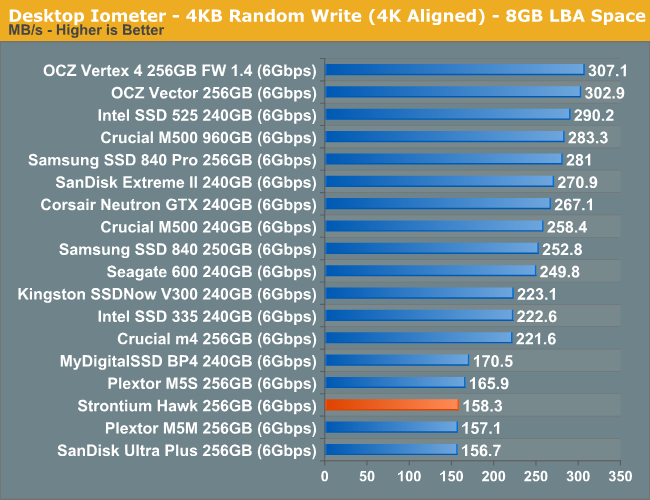
As I mentioned earlier, random performance is not Hawk's biggest strength.
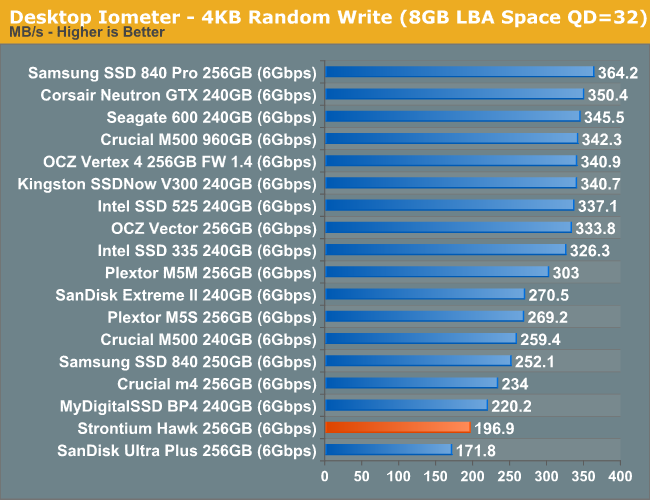
Sequential Read/Write Speed
To measure sequential performance I ran a 1 minute long 128KB sequential test over the entire span of the drive at a queue depth of 1. The results reported are in average MB/s over the entire test length.
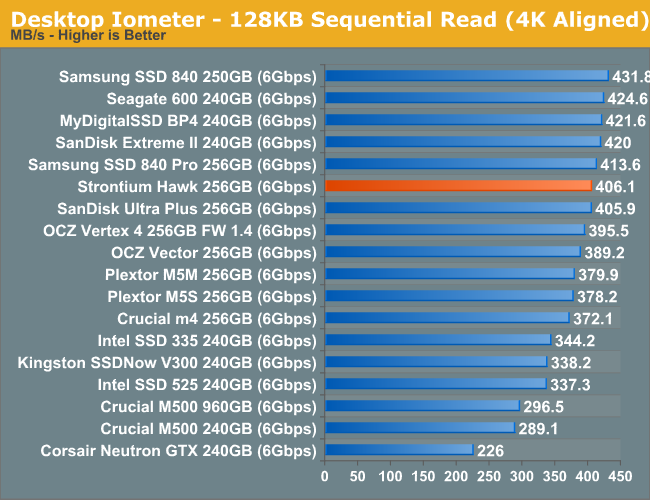
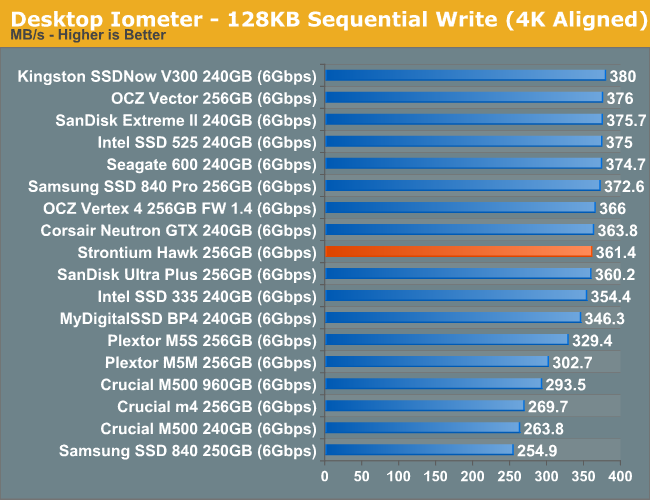
AS-SSD Incompressible Sequential Read/Write Performance
The AS-SSD sequential benchmark uses incompressible data for all of its transfers. The result is a pretty big reduction in sequential write speed on SandForce based controllers.
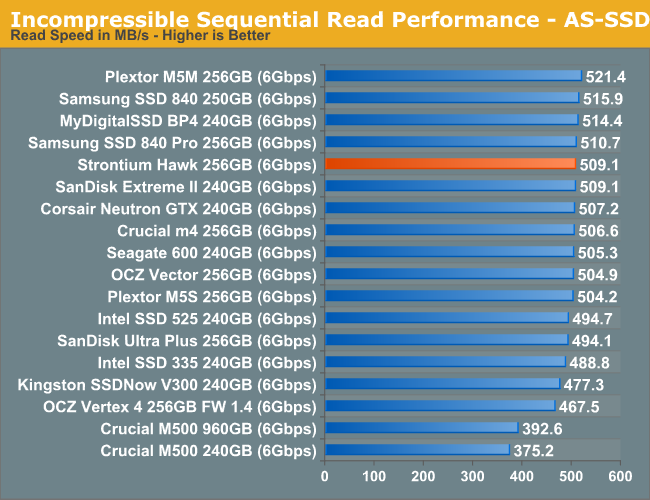
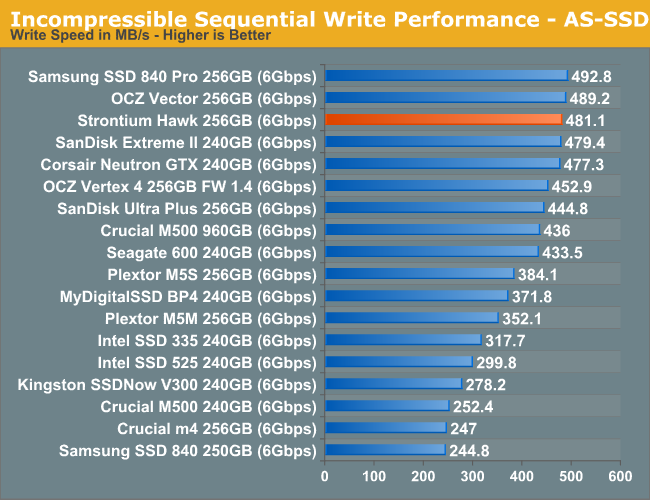










26 Comments
View All Comments
karasaj - Tuesday, June 25, 2013 - link
Every time I kept reading that, I kept thinking about how no name suppliers would be bad... hard to remember it's from Toshiba, haha. Good luck to them. Nice review :) Power consumption seems obnoxiously low at load.mcveigh - Tuesday, June 25, 2013 - link
Strontium Hawk is the name of my spirit animal!jmke - Tuesday, June 25, 2013 - link
not the best product name I must admit... might not do well in Benelux ;)http://translate.google.com/?hl=en#nl/en/stront
Pessimism - Tuesday, June 25, 2013 - link
Why poo-poo the manufacturer for taking a stand to end the 1000^3 garbage? Everyone should follow suit and label with formatted capacity.hedleyroos - Tuesday, June 25, 2013 - link
Your use of the word "poo-poo" is ironically funny to people who speak Afrikaans (and probably Dutch and Flemish) since "stront" means "poo". They have zero chance of succeeding in those markets.Kristian Vättö - Tuesday, June 25, 2013 - link
Like I said, it's pretty much useless for a small OEM like Strontium to try and change the industry.piroroadkill - Tuesday, June 25, 2013 - link
It should then say 240GiB...dealcorn - Tuesday, June 25, 2013 - link
OK. Laptops outsell desktops and you were unable to test with HIPM and DIPM enabled and no mention was made of DEVSLP support which is a big deal for any Haswell mobile device. By impairing the relevance of the review to typical use cases, someone properly earns a demerit.You need a Haswell mobile device to test with if you want to maintain relevance to the mainstream market. I would complain to my bosses that you need better hardware support to perform at the level they and readers expect of you.
Kristian Vättö - Tuesday, June 25, 2013 - link
I'll be brutally honest here. Just because we are AnandTech doesn't mean that we have piles of laptops laying around, especially ones that are based on a chip that was released less than a month ago. All reviewers want Haswell-based devices at the moment, the supply is extremely tight. Usually laptops only have a review time of two weeks or so because the same system may be sent to others once it's been returned. Obviously reviewers who are actually going to review the system are the first priority, so it'd be really hard for me to get one because 1) I would only be using it for one test 2) I couldn't send it back anytime soon. In other words, the manufacturer wouldn't get much bang for their marketing $ because they wouldn't get much visibility, which is the reason review samples exist in the first place.I know there's the option of buying one but again, I'll be honest here: It would be around $1000 for just one test. I would definitely take one if Anand paid for it but as far as I've understood, Anand isn't into spending thousands on test equipment (keep in mind that the financial situation isn't all that good for us since it's usually the marketing budgets that get cut when bad times hit, so it's harder for us to get advertisers). There's a ton of stuff I'd love to have as they would really take our SSD tests (especially power related) to a next level but I'm not the one making decisions.
We have talked with Intel and ASUS and asked if there's anyway HIPM/DIPM could be enabled on a desktop system (even via custom firmware) but as far as I know, they are not up for that.
Trust me, I would take a Haswell laptop on a heartbeat if someone gave me one, but I hope you also understand that we don't get whatever we want from manufacturers.
dealcorn - Tuesday, June 25, 2013 - link
Well handled and responsive to my concern. So, BK is telling his team we have a winning hand but we need to release products faster. Anandtech is arguably the premier web site consumers turn to for help understanding how new technology benefits them. Intel, however, makes no effort to ensure you have access to the hardware necessary to explain why consumers should value the new stuff. If Intel is trying to increase the cadence, they should step up their game. If Intel does not understand that, it lessens BK's credibility.